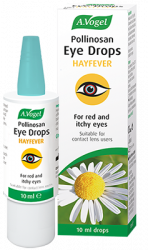What are probiotics?
Probiotics consist of bacteria and yeasts. They are also known as 'good' or 'friendly' bacteria and can be consumed via a supplement, as well as through certain foods.
Probiotics are thought to have various health benefits, including helping to reduce instances of diarrhoea, constipation and bloating.
More recently, research has focused on how probiotics can help seasonal allergies and the results therein look promising.
In this blog, I answer some common questions on this topic, including:
- Can probiotics help hayfever?
- How can probiotics help seasonal allergies?
- Which probiotics are best for allergies?
Can probiotics help hayfever?
Many studies have highlighted the benefits of using probiotics to manage and reduce hayfever symptoms.1
In a randomised trial involving 47 children with hayfever symptoms triggered by birch tree pollen, probiotics were seen to have a positive impact on symptoms. Participants were given a supplement containing the probiotic Lactobacillus acidophilus NCFM in combination with Bifidobacterium lactis Bi-07, or a placebo.
In peak hayfever season, tests showed that those taking two strains of probiotics had lower levels of eosinophils in the nose area compared with the placebo group. Eosinophils are white blood cells involved in the immune response used to control allergies.2
In addition, the participants on the two-strain probiotic had fewer nasal symptoms, including congestion and a runny nose, compared with the placebo group.
This particular study began one month prior to the usual hayfever season. This suggests it may be more beneficial to take probiotics in preparation for the hayfever season, rather than just when it has already begun.
How can probiotics help seasonal allergies?
When suffering from seasonal allergies, the immune system effectively over-reacts to contact with pollen. 80% of our immune cells reside in the gut so it makes sense to suggest that using a probiotic to keep this area healthy and happy may have a positive impact on allergy symptoms.
Additionally, many scientists believe a lack of diversity in gut bacteria can further contribute to hayfever. This is known as the 'hygiene hypothesis' and is caused by our focus on hygiene and cleanliness in modern life. Therefore, using probiotics to increase the variety and balance of bacteria in the gut could lessen the impact of allergies and support immune function.
Which probiotics are best for allergies?
There are various foods that contain probiotics, including kefir, sauerkraut, tempeh, miso and kombucha. However, these kinds of fermented foods can also be high in histamine, which we would want to avoid during the hayfever season.
Therefore, if you would like to try probiotics to help your allergy symptoms, a supplement may be a better option. You can have a look in your local health food store to see what is available.
Yoghurts can be another source of probiotics, provided they have live added cultures added to them. It is worth noting, however, that some yoghurts contain a lot of refined sugar, which can hamper immune function. Moreover, consuming a lot of dairy can actually make hayfever symptoms such as a runny nose and congestion worse, so we'd want to be careful about how much we consume during the allergy season. Dairy-free live yoghurts are a useful option at this point.
One final tip - This blog has explained the benefits of using probiotics to help manage hayfever symptoms, however, if you would like more information on how probiotics can aid other aspects of our health, I'd recommend checking out our blog '7 impressive health benefits of probiotics'.




 Looking for relief of red and itchy eyes due to hayfever?
Looking for relief of red and itchy eyes due to hayfever?

